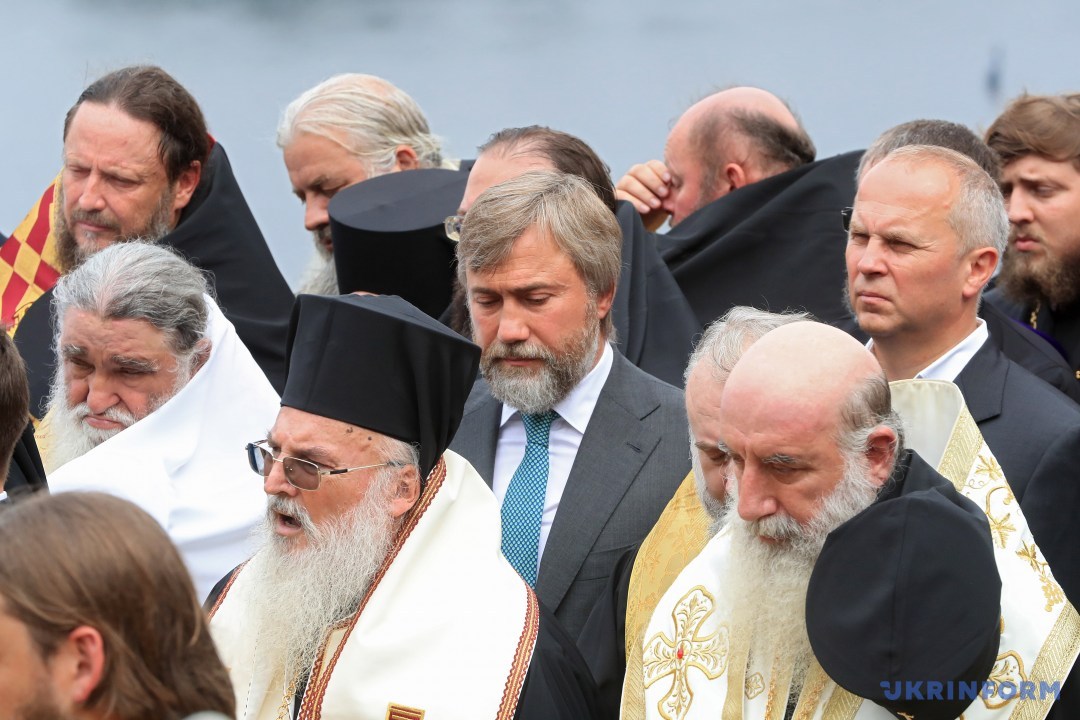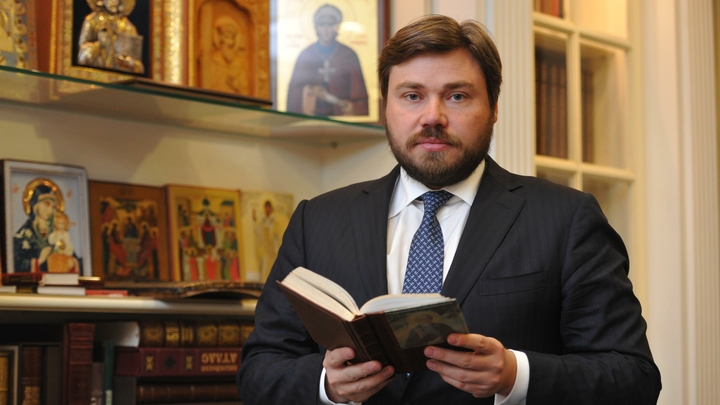Vadim Novinsky

Ms. Samokhvalova says that an interesting detail to the biography of Novinsky is that he owned the Crimean soccer club FC Sevastopol until the peninsula was annexed by Russia in 2014 and the club was left in limbo. This June, rumors emerged that Novinsky had bought FC Chonomorets (Odesa). Novinsky denied the rumours.
The author of the article says that acquiring another soccer club would match the pattern of the typical behavior of the Russian business leaders abroad.
Big business is an international phenomenon, and normally, the rich live all over the world, where they support social initiatives, science, and arts in the country where they make their profits, staying out of local politics. But when we speak about large businessmen from Russia, we should abandon this axiom, assumes the journalist.
Ivan Savvidis
Putin’s ally, Russian tobacco tycoon Ivan Savvidi or Savvidis as he’s known in Greece was the 30th wealthiest Russian businessman in the world in 2013, according to Forbes. In 2012, he acquired ownership of the Greek football club PAOK. In the following years, he bought a number of Greek assets including the Greek tobacco company SEKAP. Later he purchased a few Greek media assets.

Savvidis is a former member of the Russian parliament. As a local of the Russian southeast city of Rostov, he took part in the rebirth of the Don Cossackdom (later in 2014, the paramilitary Cossack groups participated in the Russian invasion of the East-Ukrainian regions).
Ms. Samokhvalova reminds that Ivan Savvidis is a church patron and a holder of several Russian Orthodox Church (ROC) awards, who was a prominent organizer of the pilgrim journeys of the Russian citizens to Greece, and who participated in the local ROC council in 2009.
His church activities are pretty similar to what Novinsky does in Ukraine. Savvidis “is being accused in the wrongdoings which are familiar and in tune with the deeds of Novisnky,” the article reads, “For example, Savvidis spent 300,000 EUR for the campaign to rename Macedonia.”
For decades, Greece has been opposing the use of the name “Macedonia” by its northern neighbor country, whose formal name due to the dispute is “the former Yugoslav Republic of Macedonia” or FYROM for short. There is an adjacent Greek region of Macedonia and there was the ancient Greek kingdom of Macedon, and Greece wants the Slavic state to add a geographical qualifier to the name of the country to rename it as “Northern Macedonia.” Greece effectively blocks Macedonian EU and NATO aspirations, and the country’s name dispute is the reason. This year, Greece and FYROM finally reached an agreement resulting in the renaming of Macedonia into the Republic of North Macedonia.
The official website of Ivan Savvidis reads, “In 2013 he was awarded the status of the Honourable citizen of Greece for his special role and contribution into development of relations between Russia and Greece, merits to the Greek nation, Greek republic, world Orthodoxy, public and philanthropic activities.”
“And here the Greek honorable citizen attempts to scuttle the accords of Greece. And this is the answer to the question whose interests the Russian businessman of Greek origin and with a Greek name will protect, when state interests are at stake, and how exactly he would assert his influence, which includes the church, media, and football. The figure of the 300,000 EUR for the [anti-name-change] protests in Macedonia is telling,” concludes Samokhvalova.
Sergey Samsonenko
Large-scale Russian entrepreneur Sergey Samsonenko is the wealthiest man in Macedonia who owns three sports clubs in the country. He founded a large gambling company, built the hotel “Rossiya” in the Macedonian capital city of Skopje, established an airline, and became an honorable Russian consul in the second largest city of Macedonia.

According to a 2017 RBC report, honorable consul Samsonenko funded the VMRO local party, which acts in Russian interests. At his own expense, he renovated the building of the Russian consulate and head of the Macedonian Orthodox Church, Archbishop Stefan, personally consecrated it.
He also funded the construction of a church and presented a yacht to a local Orthodox Metropolitan. The Macedonian counterintelligence viewed the latter incident as an example of Russian meddling in the country’s internal affairs, Samokhvalova says.
She concludes that Samsonenko doesn’t just promote Russia in Macedonia, but also shapes an agenda favorable for Russia.
Konstantin Malofeev
Decorated with many ROC orders, Russian Oligarch Konstantin Malofeev is a founder of some church foundations. In Ukraine, he’s known for his participation in the Russian special operation to annex Crimea as an aide and financier. Malofeev is in touch with the European ultra-right, and he organized and moderated a meeting of the Russian politicians with the European far rights in Vienne in late May 2014.

The oligarch has plans to create a media holding in Serbia. With his support, the Holy Fire, described by Orthodox Christians as a miracle that occurs every year in Jerusalem, was delivered to the Serbian capital, Belgrade in 2016.
And it was enough for Bosnian Serb leader Milorad Dodik to award Malofeev with his allies an Order of Njegos – First Degree for contribution to the “formation of the Republika Srpska.”
“For today there are various predictions about the further developments in Serbia and its relations to Kosovo. But such figure as Malofeev signals that the role of the instigator is occupied,” concludes the journalist.
Roman Abramovich
Earlier the Foreign Affairs Committee called on the British government to “get serious” and crack down on Kremlin-linked individuals using London as a base for corrupt assets.

As Samokhvalova highlights, Roman Abramovich didn’t meet with the Archbishop of Canterbury, like his friends in the Balkans with Orthodox leaders in the countries they reside, and didn’t try to tighten relations with the members of the Conservative Party, “however, the pro-Russian aristocratic hangouts are formed there.”
Oleg Deripaska
Russian aluminum magnate Oleg Deripaska sued the Balkan country of Montenegro which expropriated the Aluminium Plant Podgorica. The oligarch intentionally destroyed the production at the enterprise just like he deliberately destroyed the Zaporizhzhia Aluminium Smelter in Ukraine in the interests of Rusal, his Russian company.

Samokhvalova assumes that Deripaska could be part of the Montenegrin coup plot, however, no evidence was presented by the officials or media to back the claim. Some politicians in Montenegro stated that Deripaska funded pro-Russian parties.
Dmitry Rybolovlev
Russian oligarch Dmitry Rybolovlev is a citizen of Cyprus, where authorities grant citizenship to investers in the country’s real estate and bonds.

In 2011 he moved to Monte Carlo. The local soccer team AS Monaco FC, seven-times champions of France, needed an investor to overcome a profound crisis. The company Monaco Sport Invest (MSI), linked to tycoon Dmitry Rybolovlev, signed a deal to become the majority shareholder of AS Monaco. And Rybolovlev himself became president of the club. However, later Monaco declared him persona non grata because of a corruption scandal.
In line with other Russian oligarchs, Rybolovlev funded “The Eye of God,” a movie by Leonid Parfenov, renovated the Cathedral of the Nativity of Our Lady in Moscow’s Conception Convent, constructed an Orthodox church dedicated to Holy Nikolaus in the city of Limassol in Cyprus.
Though, this Russian tycoon met his misfortune too. In 2008, Rybolovlev bought the Palm Beach mansion once owned by Donald Trump, spurring questions about the big profit Trump made on the deal amid the financial crisis. And in February 2018, Sen. Ron Wyden, the top Democrat on the US Senate Finance Committee, asked the Treasury Department for any records involving a Russian oligarch and his purchase of a Palm Beach. His letter noted that Trump bought the property in 2004 for $41 million and then sold it to the Rybolovlev-owned company in 2008 for $95 million. Rybolovlev had never visited the property before he bought it.
The US Treasury Department put Rybolovlev on the “Putin list,” which includes 114 senior political figures and 96 oligarchs, all of whom rose to prominence under Russian President Vladimir Putin. Thus he became a potential candidate for US sanctions.
Exporting corruption
Soccer, ecclesiastical matters, strategic and real estate industries are the spheres of interest of Russian oligarchs abroad.
You can create any number of organizations for the pro-Russian aristocracy, but in case of fraud, the Royal Family will take the side of their cheated non-oligarch compatriot, not the one of the Putin friend, as it happened in Monaco. You can bribe the opposition, but your aluminum factory will be confiscated if you lead it to bankruptcy.
“The import of corruption and games with issues sensitive for local communities cannot last forever, when state security and dignity are at stake,” stresses Ms. Samokhvalova.
Read also:
- Why the arrest of Firtash may mean the death of the Russian mafia
- Many Russians will welcome harsh Western actions against oligarchs
- Russian networks in Bulgaria
- Arrest of Deripaska’s Escort ‘Rybka’ in Thailand may be key to Mueller Investigation
- The paid word: who owns Ukrainian media
- How Russia’s use of deniable assets bamboozled western security services
- Anti-Semitism tolerated by pro-Kremlin propaganda
- Kremlin prepared Ukrainian scenario even before Yanukovych’s flight
- How Putin influences French policy
- Aleksandr Dugin and the SYRIZA connection
- Plans for a “Great Serbia” and the Kremlin’s hybrid war in the Balkans


